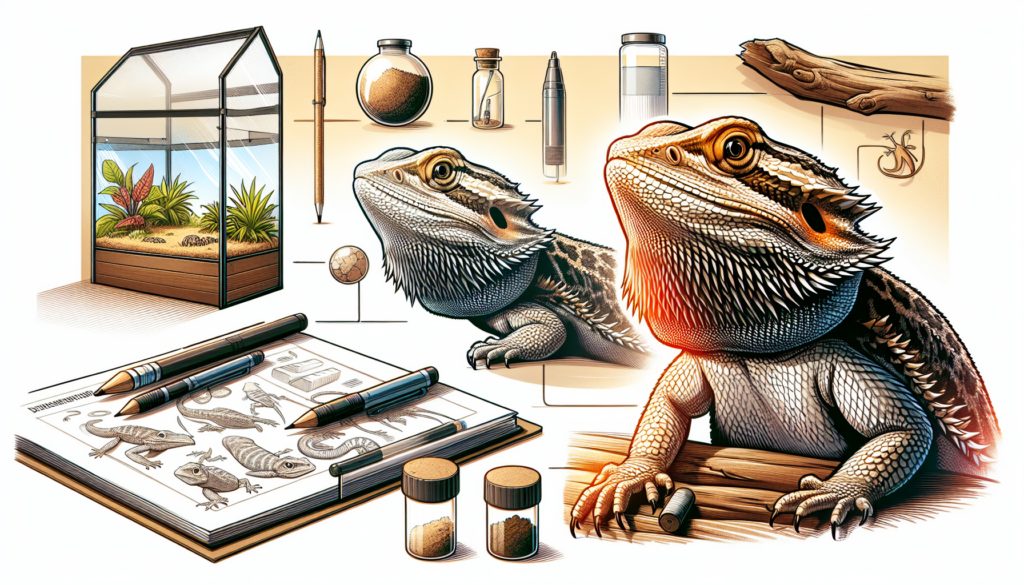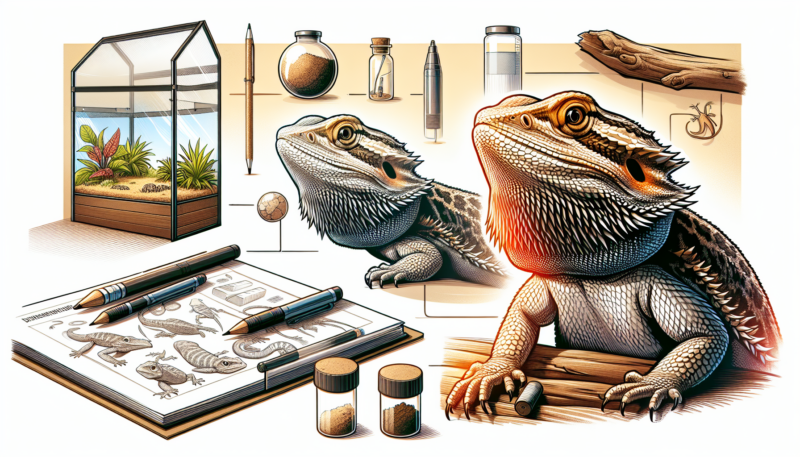If you’re considering adding a new pet to your family, why not consider a bearded dragon? These captivating creatures make great pets for reptile enthusiasts and beginners alike. With their unique appearance and docile nature, bearded dragons have become increasingly popular in recent years. In this article, we’ll explore why bearded dragons can be fantastic companions, discussing their low-maintenance needs, friendly temperament, and fascinating behavior. So, if you’re ready to embark on a reptilian adventure, read on to discover if a bearded dragon is the perfect pet for you.

Overview
Bearded dragons, also known as Pogona vitticeps, are popular reptile pets known for their unique appearance and calm demeanor. They make great companions for individuals or families looking for a low-maintenance and educational pet. In this article, we will explore the different aspects of keeping bearded dragons as pets, including their appearance, behavior, lifespan, diet, and habitat.
Appearance
Bearded dragons have a distinctive appearance that sets them apart from other reptiles. They are medium-sized lizards, typically measuring about 18-24 inches long when fully grown. They have a triangular-shaped head and a body covered in small, spiky scales, which resemble a beard or a crown of thorns around their throat area. Their skin coloration can vary greatly, from shades of tan and brown to vibrant oranges or reds. Bearded dragons also have a long, muscular tail that they use for balance and communication.
Behavior
One of the reasons why bearded dragons are sought-after as pets is their calm and friendly behavior. They are generally docile creatures and can tolerate handling and interaction well. Bearded dragons have a reputation for being friendly and curious, making them suitable pets for both experienced reptile owners and beginners. They rarely show aggression and are more likely to display signs of stress or fear through their body language, such as puffing up their beard or flattening their body against the ground.
Lifespan
Bearded dragons have a relatively long lifespan compared to other reptile species. When well cared for, they can live anywhere between 8 to 14 years, with some individuals even reaching 15 years or more. The lifespan of a bearded dragon is influenced by factors such as genetics, diet, and overall healthcare. Providing them with a suitable and enriching environment, along with regular veterinary check-ups, will contribute to their longevity.
Diet
In the wild, bearded dragons are omnivorous, meaning they consume both plant matter and insects. As pets, their diet should consist of a balanced mix of greens, vegetables, fruits, and insects. Leafy greens such as collard greens, mustard greens, and dandelion greens are excellent choices for their vegetable intake. Fruits like berries and melons can be given occasionally as treats. Insects like crickets, mealworms, and dubia roaches serve as the primary source of protein. Young bearded dragons require more insects in their diet compared to adults, and their food should be properly dusted with calcium and vitamin supplements.
Habitat
Bearded dragons originate from the arid regions of Australia and are adapted to desert-like environments. Their ideal habitat should mimic these conditions as closely as possible. A glass tank or enclosure of at least 40 gallons is recommended for a single adult bearded dragon. The enclosure should include proper lighting, temperature gradients, and substrates such as reptile carpet or sand. It is crucial to provide a hiding spot, a basking area with a heat lamp, and a UVB light source to simulate natural sunlight. Regular cleaning and maintenance of the habitat are necessary to ensure the health and well-being of the bearded dragon.
Benefits of Keeping Bearded Dragons as Pets
Low Maintenance
One of the main advantages of owning a bearded dragon as a pet is their relatively low maintenance requirements. Compared to other traditional pets such as dogs or cats, bearded dragons require less attention and care. They do not need to be walked, groomed, or taken to veterinary appointments as frequently. Their enclosure can be easily cleaned and maintained, and feeding them consists of providing a balanced diet and monitoring their wellbeing regularly.
Quiet and Calm
For individuals living in apartments or homes with noise restrictions, bearded dragons are an excellent choice. They are quiet and will not disturb neighbors or household members with excessive noise. Their calm and peaceful nature translates into a tranquil and relaxing pet ownership experience. Bearded dragons do not vocalize and are not prone to making loud noises, making them ideal companions for those seeking a peaceful living environment.
Suitable for Apartments
As mentioned earlier, bearded dragons adapt well to smaller living spaces, making them suitable for apartment dwellers or individuals with limited space. Their enclosure can be set up in a corner or a designated area without taking up much room. While providing enough space for your bearded dragon to move around comfortably is essential, they are not as demanding in terms of space requirements as other larger pets.
Educational Value
Owning a bearded dragon can be a highly educational experience, particularly for families with children. These reptiles provide a unique opportunity for children to learn about biology, natural habitats, and the principles of responsible pet ownership. Taking care of a bearded dragon requires understanding their dietary needs, habitat requirements, and overall health. This knowledge fosters a sense of responsibility and empowers children to develop a lifelong interest in science and the natural world.
Considerations Before Getting a Bearded Dragon
Time Commitment
While bearded dragons are relatively low maintenance pets, they still require time and attention. Feeding them, cleaning their enclosure, and monitoring their health regularly requires consistency and dedication. Additionally, bearded dragons benefit from daily interaction and socialization, which promotes their overall well-being. Before bringing a bearded dragon home, consider whether you have the time and commitment to provide them with the necessary care and attention they deserve.
Financial Considerations
Owning a bearded dragon also comes with financial responsibilities. The initial cost of acquiring the necessary equipment, such as an enclosure, lighting, heating, and substrate materials, can be significant. In addition to the setup, ongoing expenses include food, supplements, and veterinary care. Be prepared to budget for these costs to ensure the proper care and well-being of your bearded dragon.
Space Requirements
While bearded dragons do not require extensive space, they still need an adequately sized enclosure to thrive. A 40-gallon tank is recommended for a single adult bearded dragon, and larger enclosures are necessary for multiple individuals or larger species. Consider whether you have enough space in your home to accommodate their enclosure and create a suitable and comfortable habitat.
Legal Restrictions
Before purchasing or adopting a bearded dragon, it is essential to research and understand any legal restrictions in your area. Some regions have specific regulations regarding ownership or require permits for certain reptile species. Ensure that you comply with local laws and regulations to avoid any legal complications or penalties.
Bearded Dragon Care
Housing and Enclosure
Providing a suitable housing and enclosure for your bearded dragon is crucial for their health and well-being. A glass tank or reptile enclosure of at least 40 gallons is recommended for a single adult. The enclosure should have both a warm basking area and a cooler zone to allow for proper thermoregulation. It should be equipped with a secure lid or cover to prevent escape. The substrate inside the enclosure can be reptile carpet or other appropriate substrates that are easy to clean and maintain.
Temperature and Lighting
Bearded dragons are ectothermic creatures, meaning they rely on external heat sources to regulate their body temperature. It is essential to provide a temperature gradient within the enclosure, ranging from a warm basking spot (around 95°F) to a cooler area (around 75°F). A combination of heat lamps and ceramic heat emitters can be used to achieve the desired temperatures. Additionally, bearded dragons require UVB lighting to properly synthesize vitamin D3, which is essential for calcium absorption and overall bone health.
Feeding
A balanced and nutritious diet is crucial for the health and longevity of a bearded dragon. Their diet should consist of a mix of fresh leafy greens, vegetables, fruits, and appropriately sized insects. Offer a variety of greens such as collard greens, mustard greens, and dandelion greens to ensure they receive adequate vitamins and minerals. Insects like crickets, dubia roaches, and mealworms serve as an important source of protein. It is crucial to properly dust the insects with calcium and vitamin supplements to maintain their nutritional balance.
Handling and Socialization
Bearded dragons can become accustomed to gentle handling and socialization with proper training and patience. It is essential to start slow and gradually introduce handling sessions to allow them to become comfortable. Support their body properly and avoid squeezing or restraining them too tightly. Regular handling sessions also help strengthen the bond between you and your bearded dragon.
Healthcare
Regular veterinary check-ups are recommended to ensure the overall health and well-being of your bearded dragon. A reptile-experienced veterinarian can provide guidance on diet, habitat, potential health concerns, and perform necessary medical procedures if needed. Be aware of signs of illness, such as loss of appetite, lethargy, skin abnormalities, or changes in behavior, and seek veterinary care promptly if any concerns arise.

Training and Bonding with Bearded Dragons
Toilet Training
Bearded dragons are naturally inclined to defecate in specific areas of their enclosure. With proper observation, you can identify their preferred toilet spot. Placing a flat rock or reptile-friendly surface material in that area can help them associate it with elimination. Bearded dragons can learn to use a specific spot for their waste, making it easier to clean their enclosure.
Leash Training
Leash training your bearded dragon can allow you to take them outside for supervised exploration and sunshine. Using a reptile harness or leash designed specifically for them, gradually introduce them to wearing it by starting with short periods and gradually increasing the duration. Always monitor their behavior and comfort during outdoor excursions, and never leave them unattended.
Bonding Activities
Establishing a bond with your bearded dragon can be achieved through regular handling, gentle interaction, and providing engaging activities. Offer them enriching experiences, such as supervised exploration of a secure area outside their enclosure, introducing them to new textures, or providing toys that encourage mental stimulation. Spending quality time together will help strengthen your relationship and trust.
Potential Challenges of Owning Bearded Dragons
Specific Dietary Needs
Bearded dragons have specific dietary requirements that need to be met to ensure their health. Providing a balanced and varied diet, along with proper supplementation, is essential for their overall well-being. The availability of fresh greens, vegetables, and appropriate-sized insects can sometimes be a challenge, depending on your location or season. It is important to ensure a reliable source of nutrition for your bearded dragon.
Exotic Veterinarian Care
Finding a veterinarian with experience in treating reptiles, particularly bearded dragons, can be more challenging compared to finding a traditional pet veterinarian. It is crucial to locate a reptile-experienced veterinarian before bringing a bearded dragon into your home. Regular veterinary check-ups and prompt medical attention when needed are vital for their health and longevity.
Potential Aggression
While bearded dragons are generally docile and friendly, individual temperament can vary. Some bearded dragons may display occasional signs of aggression, especially when they feel threatened or stressed. This may manifest in behaviors such as puffing up their beard, hissing, or biting. Proper handling techniques, socialization, and a calm environment can help prevent aggression and promote a positive relationship between you and your bearded dragon.
Suitability for Families
Child-Friendly
Bearded dragons can be suitable pets for families with children. They have a gentle nature and are generally tolerant of handling. However, close supervision is important to ensure the safety of both the children and the bearded dragon. Teach children to handle the bearded dragon gently and with respect. Always supervise interactions between young children and pets to prevent accidental harm.
Interaction with Other Pets
Bearded dragons can coexist with other pets in the household if proper precautions and introductions are made. Dogs and cats should be monitored closely during initial interactions to ensure they do not view the bearded dragon as prey. It is important to provide a secure and separate enclosure for the bearded dragon to prevent any potential harm, especially when unsupervised.
Bearded Dragons in the Wild
Natural Habitat
Bearded dragons are native to the arid regions of Australia, including deserts and semi-arid woodlands. They are expert climbers and are often found basking on rocks or tree branches to regulate their body temperature. In the wild, bearded dragons are diurnal, meaning they are active during the day and rest at night. They are excellent at camouflage, blending into their surroundings to avoid predators and capture prey.
Conservation Status
As with many reptile species, bearded dragons face threats in their natural habitat due to habitat loss, climate change, and illegal wildlife trade. While the conservation status of bearded dragons varies depending on the specific species and regions, it is essential to support responsible pet ownership practices and respect their natural habitats. Avoid purchasing wild-caught individuals and ensure that any captive-bred bearded dragons come from reputable breeders who prioritize the well-being and conservation of the species.
Legal Considerations
Ownership Regulations
Before bringing a bearded dragon home, it is essential to research and understand the ownership regulations in your area. Some regions may have restrictions on certain reptile species or require permits for ownership. Complying with local laws and regulations not only ensures your legality but also promotes responsible pet ownership and species conservation.
Import and Export Regulations
If you are considering acquiring a bearded dragon from a different country or state, it is crucial to familiarize yourself with the import and export regulations regarding reptiles. These regulations vary between countries and even within states, and failure to comply can result in legal consequences and potential harm to the animal. Research and follow the appropriate procedures to ensure a legal and ethical acquisition process.
Conclusion
Bearded dragons make wonderful pets for individuals or families seeking a unique and engaging companion. Their distinctive appearance and calm demeanor, combined with their low-maintenance nature, make them highly desirable reptile pets. From their educational value to their suitability for apartment living, bearded dragons offer a range of benefits to their owners. However, it is important to consider the time commitment, space requirements, and financial responsibility that come with owning a bearded dragon. By providing them with appropriate housing, a well-balanced diet, regular veterinary care, and training and bonding opportunities, you can establish a rewarding and fulfilling relationship with your bearded dragon. Remember to research and comply with legal regulations and to respect the natural habitats of bearded dragons. With proper care and attention, these captivating reptiles can bring joy and companionship for many years to come.
